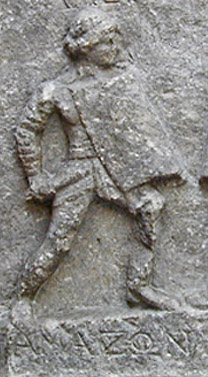 Amazon, a female gladiator
Amazon, a female gladiatortestament of release from the arena
Halicarnassus, 1-2 century CE
No woman is named by Juvenal in his sixth satire, a diatribe against Roman women; at 695 verses, it is the longest of his sixteen satires, inspired by the announcement by his friend Postumus of his intention to take a wife. In an effort to dissuade him from marriage, the satirist offers multiple instances of what he considers widespread misbehavior of upper-class females, while overlooking examples of contemporary males who disregard traditional Republican mores. Here he ridicules the freeborn woman who chooses to appear in the gladiatorial games in the arena. Although a few citizen women appeared on the stage during the Republic, not until 22 BCE did the Senate find it necessary to pass a law banning freeborn women below the age of 20 from the stage and the arena. By 11 CE the prohibition was violated so often it was deemed insufficient, as the gladiator was a highly polarised figure in Roman culture -- at once feared, despised and admired (see Seneca, De Constantia 16.2, Epistulae Morales 30.8, De Tranquilitate 11.4-5). In 19 CE another senatus consultum was issued under Tiberius and distributed beyond the city of Rome (a bronze tablet containing a portion of the edict was found at Larinum), forbidding all those of senatorial and equestrian rank from performing on stage and in the arena on penalty of loss of social status (infamia). Nevertheless, the emperors Caligula and Nero claimed exemption and material and textual testimony survives that female gladiators, for the most part slaves, were special features of games under the Empire. In the passage below, Juvenal excoriates this particular aspect of female transgression -- the femina Romana, rejecting her culturally sanctioned identity as matrona, mulier, coniunx, uxor or puella, assumes the warrior costume and practices of a gladiator seeking bloody victory in the arena. He enumerates her attempts to appear masculine as she dons clothing that suggests the hated Greek and freely chooses slave status, only to be laughably unmasked by her physiology. Juvenal's description of elements of her costume are a mix of those worn by different gladiator types, particularly the foreign Thraex and the Roman Samnite. Exploring the travesty of indulged women assuming the heavy rough garb of the gladiator and mimicking feats beyond the nature of the female sex, he reproves them as unworthy descendants of the most distinguished Republican families (naming the Lepidi, Metelli and Fabii) and guilty of conduct a common female performer would not exhibit (compare Cicero's denunciation of Clodia Metelli, in the persona of her famous ancestor, Appius Claudius Caecus). The satirist's misogynist rant could be dismissed as an exaggeration were there not other examples of noblewomen breaking sexual taboos in the early Empire, such as the aristocratic matrona Vistilia, who entered her name in the public list of prostitutes to avoid the penalties of loss of property and exile for adultery, and Messalina, cousin and wife of the emperor Claudius, who, while empress and mother of his two legitimate heirs, openly married a young aristocrat, in effect divorcing the emperor. The meter of Latin satire is dactylic hexameter (see explanation of Latin meter; scanning dactylic hexameter; dactylic hexameter: video) . For more information on the topics in this essay, see B. Levick (1983) and A. McCullough (2008) in the Bibliography.
Endromidas Tyrias et femineum ceroma
quis nescit, vel quis non vidit vulnera pali,
quem cavat adsiduis rudibus scutoque lacessit
atque omnis implet numeros dignissima prorsus
250 Florali matrona tuba, nisi si quid in illo
pectore plus agitat veraeque paratur harenae?
Quem praestare potest mulier galeata pudorem,
quae fugit a sexu? Vires amat. Haec tamen ipsa
vir nollet fieri; nam quantula nostra voluptas!
255 Quale decus, rerum si coniugis auctio fiat,
balteus et manicae et cristae crurisque sinistri
dimidium tegimen! Vel si diversa movebit
proelia, tu felix ocreas vendente puella.
Hae sunt quae tenui sudant in cyclade, quarum
260 delicias et panniculus bombycinus urit.
Aspice quo fremitu monstratos perferat ictus
et quanto galeae curvetur pondere, quanta
poplitibus sedeat quam denso fascia libro,
et ride positis scaphium cum sumitur armis.
265 Dicite vos, neptes Lepidi caecive Metelli
Click on the underlined words for translation aids and commentary, which will appear in a small window. Click on the icon link
![]() to the right of the
poem for related images and information.
to the right of the
poem for related images and information.